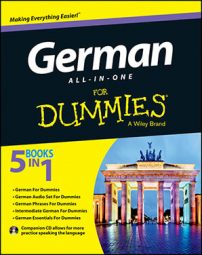German has three words — der, die and das — for the definite article the. To make matters more confusing for someone learning German, these three definite articles change spelling according to the case of the noun that they appear with in a sentence.
The same is true for the indefinite articles. Just as English has two indefinite articles — a and an — that you use with singular nouns, German also has two indefinite articles (in the nominative case): ein for masculine- and neuter-gender words and eine for feminine-gender words.
Another similarity with English is that the German indefinite article ein/eine doesn’t have a plural form. Depending on how you’re describing something plural, you may or may not need to use the plural definite article. Consider the following generalized statement, which requires no article: In Zermatt sind Autos verboten. (Cars are forbidden in Zermatt [Switzerland].)
The following table shows you the definite articles and the corresponding indefinite articles (nominative case):
| Gender/Number | Definite (the) | Indefinite (a/an) |
|---|---|---|
| Masculine | der | ein |
| Feminine | die | eine |
| Neuter | das | ein |
| Plural | die | (no plural form) |

